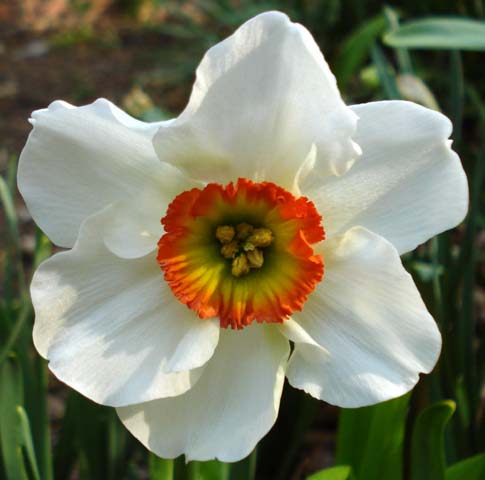Narcissus, by Caravaggio (1594-1596)
From: Metamorphoses, Book III by Ovid, ca. 8 AD; Guide to Greece, 9.31.7 by Pausanias, ca. 140 C.E.; similar accounts in Conon's Narrations and a parchment fragment found in the Oxyrhynchus papyri.
"The more she followed him the hotter did she burn,
As when the flame flares upward from the sulphur on the torch.
Oh, how she longed to make her passion known!
To plead in soft entreaty! to implore his love!"
-Metamorphoses by Ovid
Greece is a craggy, mountainous place, which makes its many different kinds of wildflowers, bursting from every crevice, all the more spectacular. The ancient Greeks and Romans certainly noted this, and have passed down several myths concerning the origins of such flowers. One such story is about a beautiful young man named Narcissus. This guy was like Johnny Depp to the power of Clark Gable. Every woman was into him, and each did whatever she could to get his attention, but he refused them all.
The Nymph Echo, by Dosso Dossi (1524)
Unfortunately, her situation was a little more complex. One day, Hera went down to inspect the nymphs, thinking that Zeus was getting it on with one of them. Echo was talking loudly and distracted Hera, allowing all the other nymphs to run away. Hera then overreacted, as usual, and punished Echo by allowing her only to repeat what was just said to her, and never utter anything else. Hera said to her, "Your tongue, so freely wagged at my expense, shall be of little use; your endless voice, much shorter than your tongue."
This punishment made getting Narcissus' attention even more difficult. But one day, Echo saw that her chance had come. She was hiding in the woods while Narcissus walked to a clearing and shouted "Is there anyone here?" Echo called, "Here, Here." Looking for the source of the voice, he shouted "Come!" and Echo stepped out into the meadow, answering "Come!" But Narcissus was less than pleased with what he saw, beautiful though she was. He said "I will die before I give you power over me," and Echo could only humbly, entreatingly answer "I give you power over me." Ashamed and blushing, she refused to live anywhere but caverns and canyons, which is where Echo hides to this day.
The Metamorphosis of Narcissus, by Salvador Dali (1937)
Well, Narcissus' years of being totally stuck-up would come back to bite him. Eventually, one spurned would-be lover prayed to the gods that "He who loves not others love himself." Nemesis, goddess of righteous anger, obliged, and the next time Narcissus bent over a pool of water for a drink, he looked at his reflection and was instantly in love. He understood what all those lovelorn women were so upset about, but it was too late: he could not look away. So he stayed kneeling by the pool forever more, until, dying, he said "Farewell" to himself. Echo's reply sounded through the clearing. When the wood nymphs returned to bury his body, they saw a new and lovely flower in his place, and called it by his name.
Narcissus poeticus
Notes:
-Many claim that Ovid changed the earlier version of the Greek story to make it more appealing to readers. For example, in the recovered Oxyrhynchus Papyri, Narcissus actually commits suicide at the end. Serves him right, in my opinion.
-Narcissus has been explored directly or indirectly in many different cultural works, including those of Keats (I Stood Tip-Toe Upon a Little Hill), Bob Dylan (License to Kill), and animator Norman McLaren (Narcissus).




No comments:
Post a Comment